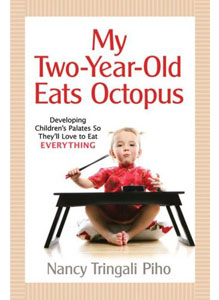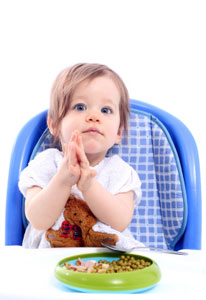 When I was growing up, one of the many mantras in our house was “This is not a restaurant, you’ll eat what I fix for dinner or go to bed hungry.” That meant from the time I went off the bottle until I moved to college I ate what was served for dinner. I had meatloaf, tuna casserole, spaghetti, hamburgers, or anything else my mom decided to fix that night, like it or not. We never had any kid food, you know, the food that is served to the kids but not the adults. Grilled cheese, hot dogs and chicken nuggets are staples in the American child’s diet, while mom and dad prepare something more age appropriate for themselves.
When I was growing up, one of the many mantras in our house was “This is not a restaurant, you’ll eat what I fix for dinner or go to bed hungry.” That meant from the time I went off the bottle until I moved to college I ate what was served for dinner. I had meatloaf, tuna casserole, spaghetti, hamburgers, or anything else my mom decided to fix that night, like it or not. We never had any kid food, you know, the food that is served to the kids but not the adults. Grilled cheese, hot dogs and chicken nuggets are staples in the American child’s diet, while mom and dad prepare something more age appropriate for themselves.
Although, when did food become age appropriate? That’s exactly what author Nancy Tringali Piho is asking and arguing in her newly released book My Two-Year-Old Eats Octopus: Raising Children who Love to Eat Everything.
I positively loved this book, and as an expectant mom, thought it should become a must-read for every expecting parent. The book introduced ideas that I hadn’t yet thought of, made me think about issues that I hadn’t paid too much attention to, and even justified some of the expectations I have for feeding my child-to-be.
Piho spent her career working in PR and marketing for the food industry, so she’s well-versed in what it is “they” are selling to us, and trying to convince us that our children need. The book is really a quick and enjoyable read that includes anecdotal quotes from chefs, parents and celebrities about the task of feeding their children, including Piho who boasts about how her two young sons have an appreciation for food rarely seen in children. More important, My Two-Year-Old Eats Octopus breaks down the task of introducing our children to the world of solid foods in a way that will cause them to be excellent eaters as a child and grow to have an appreciation for food throughout life.
The book is filled with a candid humor and uses that to draw you in to the more serious conversation the author wants to have with you as the reader. And it really does feel that way, like having a conversation. Piho never attempts to be some all-mighty expert, instead she explains that she’s a mother with food industry experience and a bit of a foodie who has found this disconnect between how we’re feeding our children and teaching them about the quality, importance and benefits of food.
Highlights of My Two-Year-Old Eats Octopus include:
- What Piho calls the Big Three. Piho explains that the American children’s diet contains too much fat, sugar and sodium, what she refers to as the Big Three throughout the book. She discusses how the diet rich in packaged foods influences the growing childhood obesity trend and repeatedly offers ways to avoid and reduce them in your child’s diet, like sticking to fresh foods.
- Make your own baby food. I found this to be one of the most valuable sections of the book. Piho discusses the limited palate American babies have, blamed on the baby food industry for offering only a limited variety of foods. In other countries baby food comes in black beans, lamb, papaya and broccoli, as well as a host of other flavors our babies never experience because they aren’t considered local favorites. She shares a taste-test wherein several flavors from different baby food brands are tried and found to have zero resemblance to the real food, not to mention a lot of sugar and sodium. No wonder our kids hate vegetables! She espouses the many benefits of preparing your own baby food at home, as it gives you better control over the food your baby will eat, will save money, and help your baby’s palate develop.
- No kid foods! That means kids eat what you eat. They learn table manners, how to appreciate the meal that is prepared for them, how to dine out at a restaurant, and much more. Plus, your child will enjoy a broader variety of foods and be far less likely to be a persnickety eater, making both of your lives easier.
Get your copy of My Two-Year-Old Eats Octopus today, released November 1, 2026.
